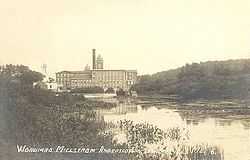Worumbo Mill
|
Worumbo Mill | |
 | |
 | |
| Location | Lisbon Falls, Maine |
|---|---|
| Coordinates | 43°59′37″N 70°4′5″W / 43.99361°N 70.06806°WCoordinates: 43°59′37″N 70°4′5″W / 43.99361°N 70.06806°W |
| Built | 1864 |
| Architectural style | No Style Listed |
| Governing body | Private |
| NRHP Reference # |
73000235 [1] |
| Added to NRHP | October 15, 1973 |
Worumbo Mill is an historic mill on the bank of the Androscoggin River in Lisbon Falls, Maine.
The mill was built in 1864 and added to the National Register of Historic Places in 1973.
The Worumbo Mill began as the brainchild of two residents of Lisbon Falls, ME, Edward Plummer and H.A. Tibbetts. Later, Oliver Moses, a businessman from Bath, ME was brought in as they sought to build a factory producing fine woolens. Ground was broken in 1864 and production began in 1865, with Mr. Moses as president of the company. Operating losses were substantial that first year at $100,000. This amount is roughly equivalent to $2 million today. During the 1920s an expansion was added to the mill and is the white building that stands today. The 1940s saw equipment upgrades. Due to pressure from overseas clothing manufacturers, the mill announced that it would be closing in 1964 and all 600 employees would lose their jobs. An attempt to restart production later failed. Finally, a fire started in the original portion of the mill on July 23, 1987, completely destroying the old portion but the 1920s expansion was spared from the flames.[2]
All told, 283 firefighters responded to the blaze. Although the fire was controlled in five hours, using 15,000 gallons of water per minute to do so (a total of 17.8 million gallons was used the first day) crews stayed for another 13 to extinguish the flames, and returned each day for over a week to be sure no flare-ups occurred. The Maine Forest Service responded with a helicopter to drop water, and crews from many surrounding towns assisted in the battle. In the end, the mill once world-famous for producing luxury woolens was reduced to rubble in one of the largest fires in Maine history.[3]
The 1920s portion of the mill was also featured in the Stephen King Novel 11/22/63.[4]
References
- ↑ "National Register Information System". National Register of Historic Places. National Park Service. 2008-04-15.
- ↑ http://www.lisbonmainehistory.org/worumbo.html
- ↑ http://www.sunjournal.com/news/lewiston-auburn/2012/07/11/overflow-crowd-remembers-worumbo-fire/1222354
- ↑ http://www.stephenking.com/promo/11-22-63/als_diner/location_shots/
| ||||||||||||||||||||||||||